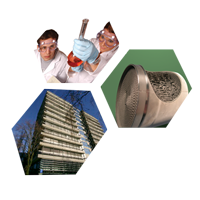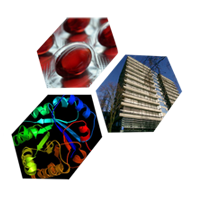The faculty that shapes the world of the future
The Faculty of Chemistry, Pharmacy, and Earth Sciences – explores synthetic and natural substances and their transformations. It focuses its research on three topical areas:
The research areas at our faculty range from resource saving and energy efficient production methods to specialty chemicals research with tailored property profiles and highly effective new active pharmaceutical ingredients with significantly reduced side effects. Through their research and the development of new materials, the faculty provides a strong knowledge network to successfully address the challenges that science and technology face today and will face tomorrow. The network is strongly based on collaborations with academic institutions, other research institutes and with industry. Our graduates will leave the University of Freiburg both academically and personally prepared for employment in academia, government or the private sector.
Synthesis & Catalysis
 Chemistry is the science of matter and the changes it undergoes during chemical reactions. Materials (proteins, biomass, building materials, pharmaceutical ingredients, etc.) are obtained by chemical synthesis. In the 21st century, the focus shifted to more efficient and ecologically friendly syntheses of new or existing substances: Catalysis. Small amounts of catalysts are used to facilitate chemical reactions and therefore prepare desired substances more efficiently – an approach, which sometimes is referred to as "Sustainable Chemistry". In our faculty, many research groups are dealing with various aspects of synthesis and catalysis. Thus, the synthesis of natural products, which can also serve as active pharmaceutical ingredients, is investigated through classical synthetic chemistry and catalytic processes. Many well-known basic chemicals – that have been used for a long time – can be obtained with less energy and with a reduced resource consumption using new catalytic processes developed in our faculty. Another field of research, our faculty is interested in, is the synthesis of hard materials, approaching the quality of diamond but being much more readily available and thus of interest for the tool manufacturing industry. The production of polyolefin materials and new “intelligent” self-healing polymers as well as the development/synthesis of new materials for the storage of heat and gases – such as Hydrogen – is also based on innovative methods of synthesis and catalysis. The synthesis and application of ionic liquids – a fascinating new class of materials whose potential has only been realized recently – is also examined in the faculty. Last but not least, some of our research groups are devoted to the developed of new electrolytes for Li-ion batteries or membranes for fuel cells as well as the prediction of results of chemical reactions and processes by the application of modern computer-chemical methods.
Chemistry is the science of matter and the changes it undergoes during chemical reactions. Materials (proteins, biomass, building materials, pharmaceutical ingredients, etc.) are obtained by chemical synthesis. In the 21st century, the focus shifted to more efficient and ecologically friendly syntheses of new or existing substances: Catalysis. Small amounts of catalysts are used to facilitate chemical reactions and therefore prepare desired substances more efficiently – an approach, which sometimes is referred to as "Sustainable Chemistry". In our faculty, many research groups are dealing with various aspects of synthesis and catalysis. Thus, the synthesis of natural products, which can also serve as active pharmaceutical ingredients, is investigated through classical synthetic chemistry and catalytic processes. Many well-known basic chemicals – that have been used for a long time – can be obtained with less energy and with a reduced resource consumption using new catalytic processes developed in our faculty. Another field of research, our faculty is interested in, is the synthesis of hard materials, approaching the quality of diamond but being much more readily available and thus of interest for the tool manufacturing industry. The production of polyolefin materials and new “intelligent” self-healing polymers as well as the development/synthesis of new materials for the storage of heat and gases – such as Hydrogen – is also based on innovative methods of synthesis and catalysis. The synthesis and application of ionic liquids – a fascinating new class of materials whose potential has only been realized recently – is also examined in the faculty. Last but not least, some of our research groups are devoted to the developed of new electrolytes for Li-ion batteries or membranes for fuel cells as well as the prediction of results of chemical reactions and processes by the application of modern computer-chemical methods.
Energy & Materials
 Tailor-made materials, composite materials, nano-structure formation and system integration of material components play a central role in modern key technologies – from power engineering to biomedicine, lightweight design and communication. Following the design principles of the Freiburger Nobel laureate Hermann Staudinger versatile macromolecules can be built, whose property profiles of molecular and supramolecular architectures can be controlled with the application. The Freiburg Materials Research is interdisciplinary and includes established close cooperation with the Freiburg Fraunhofer institutes and industry. With new inorganic and polymeric semiconductor materials (single and multi-crystalline Si, CdTe, Ge-Si mixed crystals, ZnO, and polythiophene polymer nanocomposites) is produced by solar cells and thermoelectric elements, light and electricity from waste heat. However, structural geological and hydrogeological characterization of deep geothermal usable rocks are explored. Another focus is the exploration of environmentally relevant interactions between geomaterials (fine dust, ores), hydrosphere and atmosphere. Focus on energy saving are "phase-change materials" for the new solar thermal and (poly) electrolytes and Multi-layer systems for batteries. Special emphasis on the material development is the control of function and adaptation of materials on the chemistry and physics of synthetic and biological interfaces, eg the self-organization of functionalized nanoparticles on polymer interfaces ("nanohybrids"). With these concepts, mechanical properties, heat resistance and damage tolerance of polymer materials can be improved. Together with the Freiburg Bionics and microsystem technology are explored new interactive materials, which exhibit characteristics of organisms (molecular) detection, response and ability to learn, self-healing and energy self-sufficiency. The spectrum of these smart materials ("smart materials") with switchable properties ranging from adaptive plastic with on-demand variable properties and self-repair, artificial muscles, until new carriers for drug delivery and smart surfaces with switchable adsorption towards patient-specific therapy and diagnostics. About the interaction with cells and the detection signal to the detection of disease, accelerated drug screening without animal testing and the intelligent, possible to the individual needs of patients matched drug delivery and therapy. With new methods for the functional form, eg new 3D printing process, are made new and complex materials and fittings such as for tissue regeneration in medicine nation.
Tailor-made materials, composite materials, nano-structure formation and system integration of material components play a central role in modern key technologies – from power engineering to biomedicine, lightweight design and communication. Following the design principles of the Freiburger Nobel laureate Hermann Staudinger versatile macromolecules can be built, whose property profiles of molecular and supramolecular architectures can be controlled with the application. The Freiburg Materials Research is interdisciplinary and includes established close cooperation with the Freiburg Fraunhofer institutes and industry. With new inorganic and polymeric semiconductor materials (single and multi-crystalline Si, CdTe, Ge-Si mixed crystals, ZnO, and polythiophene polymer nanocomposites) is produced by solar cells and thermoelectric elements, light and electricity from waste heat. However, structural geological and hydrogeological characterization of deep geothermal usable rocks are explored. Another focus is the exploration of environmentally relevant interactions between geomaterials (fine dust, ores), hydrosphere and atmosphere. Focus on energy saving are "phase-change materials" for the new solar thermal and (poly) electrolytes and Multi-layer systems for batteries. Special emphasis on the material development is the control of function and adaptation of materials on the chemistry and physics of synthetic and biological interfaces, eg the self-organization of functionalized nanoparticles on polymer interfaces ("nanohybrids"). With these concepts, mechanical properties, heat resistance and damage tolerance of polymer materials can be improved. Together with the Freiburg Bionics and microsystem technology are explored new interactive materials, which exhibit characteristics of organisms (molecular) detection, response and ability to learn, self-healing and energy self-sufficiency. The spectrum of these smart materials ("smart materials") with switchable properties ranging from adaptive plastic with on-demand variable properties and self-repair, artificial muscles, until new carriers for drug delivery and smart surfaces with switchable adsorption towards patient-specific therapy and diagnostics. About the interaction with cells and the detection signal to the detection of disease, accelerated drug screening without animal testing and the intelligent, possible to the individual needs of patients matched drug delivery and therapy. With new methods for the functional form, eg new 3D printing process, are made new and complex materials and fittings such as for tissue regeneration in medicine nation.
Enzymes & Active Pharmaceutical Ingredients
 Enzymes are the body’s workhorses. They are responsible for catalyzing thousands of chemical reactions that make life possible. To understand what an enzyme is doing in the cell under certain conditions, its structure – as well as the structures of its cofactors, small organic or inorganic molecules – must be known. Using spectroscopic and kinetic methods, a given reaction can be investigated and understood. By using molecular biological techniques, properties of the proteins are selectively modified in order to verify postulated reaction mechanisms or generate new reactivity. The interaction of enzymes with other enzymes, with the genes of the cell, the DNA, or with biological membranes can alter the enzymatic reactivity, or even turn it on and off. These transient interactions are nowadays described with biomolecular and physicochemical techniques. Another way to control or model the activity of enzymes is the use of active pharmaceutical ingridients. The development of new drugs in a foreseeable period of time is one of the most urgent tasks in pharmaceutical and medicinal chemistry today. Within recent years, a paradigm shift has taken place in drug discovery. In addition to the target-based and structure-based design of new drugs, the consideration of biogenic substances as lead compounds has become more important. The use of biogenic active ingredients, the knowledge of their molecular mechanisms and modes of action and the search for new therapeutic target proteins improves the discovery of new drugs. Modern molecular and cell biological methods, theoretical approaches (bioinformatics) as well as genetic animal models are used to find and evaluate new target structures. The research on enzymes and active pharmaceutical ingredients is an important focus within our faculty with many participating and interacting institutes.
Enzymes are the body’s workhorses. They are responsible for catalyzing thousands of chemical reactions that make life possible. To understand what an enzyme is doing in the cell under certain conditions, its structure – as well as the structures of its cofactors, small organic or inorganic molecules – must be known. Using spectroscopic and kinetic methods, a given reaction can be investigated and understood. By using molecular biological techniques, properties of the proteins are selectively modified in order to verify postulated reaction mechanisms or generate new reactivity. The interaction of enzymes with other enzymes, with the genes of the cell, the DNA, or with biological membranes can alter the enzymatic reactivity, or even turn it on and off. These transient interactions are nowadays described with biomolecular and physicochemical techniques. Another way to control or model the activity of enzymes is the use of active pharmaceutical ingridients. The development of new drugs in a foreseeable period of time is one of the most urgent tasks in pharmaceutical and medicinal chemistry today. Within recent years, a paradigm shift has taken place in drug discovery. In addition to the target-based and structure-based design of new drugs, the consideration of biogenic substances as lead compounds has become more important. The use of biogenic active ingredients, the knowledge of their molecular mechanisms and modes of action and the search for new therapeutic target proteins improves the discovery of new drugs. Modern molecular and cell biological methods, theoretical approaches (bioinformatics) as well as genetic animal models are used to find and evaluate new target structures. The research on enzymes and active pharmaceutical ingredients is an important focus within our faculty with many participating and interacting institutes.

